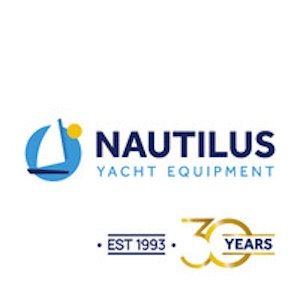Nautilus International - Experts & Thought Leaders
Latest Nautilus International news & announcements
Propspeed, a globally renowned innovator of underwater foul-release coatings, announced it has appointed Nautilus Yacht Equipment as its single-entry point for all Propspeed existing and future partners in Greece and Cyprus, effective January 1st, 2025. Focusing on yachting and light-commercial customers, Nautilus will act as importer, local warehouse, and a training and service centre for Propspeed in this growing market. Nautilus's commitment Nautilus has been a trusted Propspeed partner since 2021, establishing a strong foundation for this new appointment Nautilus has been a trusted Propspeed partner since 2021, establishing a strong foundation for this new appointment. With nine stores across Greece and Cyprus, Nautilus offers an extensive network and a dedicated team of skilled technical professionals committed to delivering exceptional service. "The Nautilus team has built a strong reputation in the region for professionalism and technical expertise," said Davide Burrini, EMEA Sales Director, Propspeed, adding "Our shared commitment to excellence in service aligns perfectly, and we are confident Nautilus will provide unparalleled support to customers in this growing market." Latest addition of Propspeed products "We only represent the finest brands in the marine industry and Propspeed is the premier foul-release coating in the business," said Alexandros Tsavdaridis, Managing Director, Nautilus Yacht Equipment, adding "We are excited to offer the full range of Propspeed products across our nine locations and support customers with our deep expertise and resources." Propspeed products include Propspeed for running gear and any underwater metals, Foulfree™ for transducers and Lightspeed™ for underwater lighting. The latest addition to the product line is Stripspeed™, a solvent-based paint stripper for underwater metals.
The crucial importance of the maritime industry to the Liverpool City Region was the focus of a full day tour for the Shadow Maritime Minister, Mike Kane MP, when he visited the area on Thursday 15th February 2024. Hosted by Mersey Maritime, alongside some of its key partners, he was given a detailed update by the regional cluster organisation for the industry in the North West before embarking on a visit to Cammell Laird and the Port of Liverpool in the afternoon. During lunch, Mr Kane also visited Nautilus International’s Mariners’ Park facilities in Wallasey to see progress on their award-winning project to deliver a combined complex of additional seafarer retirement apartments and a new head office. Greener maritime offer Reflecting on his visit, Mike Kane MP said: “It was fantastic to be back in the Liverpool City Region for an update from Mersey Maritime and to see first hand the exceptional work being delivered by key businesses such as Cammell Laird and the Port of Liverpool. Both are key drivers of the maritime industry in the region, investing in infrastructure and people to deliver excellence for the sector which makes such a substantial contribution to the local economy.” Retaining talent amongst young people to work in maritime is a big focus for both organisations" “Retaining talent amongst young people to work in maritime is a big focus for both organisations and it was fantastic to hear of the longstanding commitment to apprenticeships at the shipyard as well as how the port is delivering investment to help it transition to a cleaner, greener maritime offer.” “A future Labour government is committed to seeing economic investment into coastal communities and these areas thrive. That’s the focus of organisations like Mersey Maritime and their member businesses too and I look forward to future collaborations in the months and years to come.” Maritime policy priorities Commenting, Chief Executive of Mersey Maritime, Ruth Wood, said: “We value very much the relationship we have developed over recent years with Mike Kane in his shadow ministerial role. With maritime in the Liverpool City Region being worth over £5 billion to the economy and supporting such significant numbers of jobs, we are passionate to tell this story to parliamentarians across the political spectrum.” “Mersey Maritime has undergone much internal change in recent months, so it was good to bring Mike up to speed on our focus going forward: decarbonisation projects, skills and innovation – the themes that are at the forefront of many maritime policy priorities just now. And what better way to demonstrate these themes in action with the opportunity for two of our key members to bring him up to speed on their work too.” Highly skilled workforce Cammell Laird has undergone a significant transformation and re-organisation over recent years" Commenting, Mike Hill, Managing Director of Cammell Laird, said: “We very much welcomed the visit of the Shadow Maritime Minister to Cammell Laird and having the opportunity to showcase ourselves as a key contributor to the regional economy. Cammell Laird has undergone a significant transformation and re-organisation over recent years, investing heavily not only in key infrastructure, but in addition, and most importantly, the continuation and growth to a huge apprentice and graduate training programme.” “The individuals engaged in it undergo a training programme that has been honed by ourselves and tailored to provide a highly skilled workforce as we become fit for future. Visits such as these are important to us. It is vital that the capacity and capability of Cammell Laird is widely recognised and understood and the significant opportunity this will bring for our future workforce with maintaining our key partnerships and our ‘stronger together’ initiative.” Providing sustainable opportunities Commenting, Phillip Hall, Port Director – Mersey at Peel Ports, said: “We were pleased to welcome the Shadow Maritime Minister, Mike Kane MP to the Port of Liverpool during his recent visit to the Liverpool City Region.” “The Port is an integral part of the city’s heritage and with its connections to the world, we’re hugely ambitious about leveraging its potential to provide sustainable opportunities that will allow the region to continue to thrive. We were very happy, therefore, to talk to the Shadow Minister about our significant investments at the Port, not only with regards to our leading infrastructure but also in the next generation of the Port’s workforce.”
Regional cluster organisation, Mersey Maritime are delighted to announce that they have surpassed their initial pledge of £20,000 for The Hive Youth Zone, a local charity providing essential support for disadvantaged youth. The impressive sum of £43,700 was raised as part of Mersey Maritime’s 20-year anniversary celebrations. Just over 12 months ago, Mersey Maritime pledged to support The Hive Youth Zone. Located just a short distance from Mersey Maritime’s headquarters in Birkenhead, The Hive serves as a purpose-built centre for young people, offering a safe haven and a vibrant hub of activities for some of the region’s most vulnerable youngsters. Personal and anonymous donations In the Liverpool City Region alone, maritime is worth £5bn a year in GVA (Gross Value Added) and supports tens of thousands of jobs. Yet coastal communities remain amongst the most disadvantaged in the UK. In the Liverpool City Region alone, maritime is worth £5bn a year in GVA During the Mersey Maritime Industry Awards 2023, hosted by local talent Sam Quek MBE, ten companies were invited to pledge £1,000 each towards the fundraising initiative to help the Hive provide hot meals throughout winter. However, the total raised on the night surpassed all expectations equating to £34,000 which included company, personal and anonymous donations. Over the last year, that brings the total raised by Mersey Maritime and its members to £43,700. Commendable fundraising effort The following companies made significant contributions to this commendable fundraising effort: Bibby Line Group Cammell Laird CMA CGM D Morgan Denholm Logistics Group Hill Dickinson Hughes Subsea Kays Medical Maersk Marine Metallurgical Consultants Ltd Maritime Transport Nautilus International Peel Ports Group Port of London Authority The SeaKing Group Walker Engineering Community growth and investing This outstanding achievement reflects the remarkable generosity of our maritime community" Ruth Wood, CEO at Mersey Maritime commented: “This outstanding achievement reflects the remarkable generosity of our maritime community and its commitment to supporting the well-being of the youth in our region. The funds raised will undoubtedly make a positive impact on the initiatives undertaken by The Hive Youth Zone, which does an incredible job of supporting our local young people.” Ruth Wood adds, “As an organisation deeply rooted in the maritime sector, we understand the importance of fostering community growth and investing in the future. The collaboration and dedication shown by our member companies in this fundraising endeavour demonstrates our mission that we are stronger together.” Surpassing the fundraising goal Catherine Sandow, Head of Fundraising at The Hive, commented: “We extend our heartfelt thanks to Mersey Maritime for their invaluable support. This contribution ensures our ongoing ability to stand by the thousands of young people who rely on us. Latest statistics show that just under 4 million children are living in poverty across the UK, and now with the cost-of-living crisis we are starting to see the devastating effect this is having on local families. We are here to assist young people, irrespective of their circumstances, providing a space for them to simply enjoy, feel included, and elevate their aspirations in a secure environment.” Catherine Sandow adds, “A special thank you goes out to the companies and individuals who generously donated. Now more than ever, our presence is crucial, but we cannot sustain our mission without the backing of businesses that prioritise community at their core. Thank you!” Mersey Maritime extends gratitude to all contributing companies and individuals for their generous support in surpassing the fundraising goal.
Insights & Opinions from thought leaders at Nautilus International
Seafaring is often deemed a ‘risky occupation’ when it comes to both physical and mental health, involving highly demanding work alongside long working hours, often poor social support, and extended periods at sea. In the Sailors Society’s recent 2022 Cadet Report, they found 57% of Generation Z, those born between 1996-2010, cadets from around the world had submitted scores suggesting anxiety, and that most believed loneliness would be the main cause of any mental health issues they faced. 79.5% also said their choice of shipping company would depend on how it treats seafarers. Seafarer well-being The need for improved seafarer well-being has led to the UK government’s allocation of £2.4 million for projects supporting seafarers’ mental health, maritime skills, diversity, and careers. This investment has been made following the Maritime 2050 report, which highlights that the high incidence of mental health conditions is primarily due to the pressures, nature, and isolation of working at sea and suggests changing technology be utilised to improve sea connectivity. Is LEO services the solution? Satellites have been imperative for both operational and welfare services, in addition to positioning and navigation Satellites have enabled communications at sea for over 50 years. They have been imperative for both operational and welfare services, in addition to positioning and navigation. Generally, communications for major maritime platforms have been provided by Geosynchronous Orbit (GEO) satellites, delivering a “broadband” style service from a few Kbps to multiple Mbps. However, Low Earth Orbit (LEO) satellites are not a new proposition. Early LEO satellites, such as the Soviet Sputnik 1 launched in 1957, provided low single-digit Kbps, while more recent Iridium NEXT satellites provide hundreds of Kbps of resilient service. New services Thanks to significant investments in ‘broadband’ high throughput LEO satellites, new services offering ‘fibre-like’ high-speed low-latency connectivity of about 100 Mbps have become available. These services enable high throughput at a reasonable cost and, if configured as part of a hybrid solution, allow for operational and welfare services to be separated. This protects welfare services for seafarers, offering more access to services like messaging and video communications, streaming platforms, and gaming. The importance of on-board connectivity The surge in demand for LEO connectivity reflects growing expectations from seafarers, and better awareness from employers, around social well-being. With long periods of separation from families and friends and work that often involves high-risk situations, seafaring can lead to a combination of anxiety, stress, and isolation. A lack of access to mental health support services can contribute to depression and increases seafarers’ risk of unhealthy coping strategies resulting in serious personnel issues and retention difficulties. Addressing communication issue The survey highlighted that 63% would consider moving to another shipping company that offered better connectivity The seafarers’ trade union, Nautilus International, further demonstrated the importance of connectivity in 2017 when it published a survey showing that 80% of its members considered communications the second most important integral collective bargaining issue. It also highlighted that almost two-thirds (63%) would consider moving to another shipping company that offered better connectivity. Need for LEO services These demands have since been exacerbated. The COVID-19 pandemic saw many seafarers facing longer periods of isolation due to imposed restrictions and extended contracts, made worse for those unable to call or message their loved ones. Generation Z crews have also grown up accustomed to having instant access to connectivity and can be reluctant to accept a job that takes this away. Together, these forces have pushed the need for LEO services to the forefront of maritime considerations, as a viable solution that meets welfare and operational needs. The benefits of LEO services LEO services offer high throughput connectivity combined with low latency, allowing crew members to access Wi-Fi and download speeds similar to those provided by home broadband. This, in turn, provides numerous benefits for physical and mental well-being: Real-time communication: Personnel can stay in touch with their loved ones and support networks while at sea, helping to reduce feelings of isolation and loneliness. Mental health support: Improved access to support services allows crew members to connect with mental health professionals and receive support for conditions like depression, anxiety, and PTS. Enhanced safety: Better connectivity allows for real-time tracking and the monitoring of location, weather data, and emergency response services, which can help prevent accidents and ensure quick response times in the event of an emergency. Remote monitoring of seafarers' health and well-being through wearable technology can also be used to monitor vital signs and detect early indications of health issues. Training: LEO services provide potential for crews to engage in virtual training, which is especially useful in cases where members are at sea for extended periods. On-demand access to training resources allows crew members to develop their skills and knowledge at sea, encouraging career advancement. Virtual training also helps establish best practices that promote onboard safety. Overcome risks with a hybrid strategy The combination of LEO and VSAT services allows large quantities of data to be exchanged at broadband speeds Relying solely on LEO satellites is a risky strategy, putting operational priorities in conflict with crew welfare, as using data for one negatively impacts the data available to the other. To avoid this, LEO services can be paired with a guaranteed VSAT solution offering a committed information rate (CIR), to ensure mission-critical operations are not compromised and to protect the high-throughput connectivity most suited to provide well-being support services. The combination of LEO and VSAT services allows large quantities of data to be exchanged at broadband speeds, and enables real-time communications and remote monitoring for operational matters, all without affecting crew services. The key to choosing the right hybrid solution A vessel and the needs of its crew members must be considered before choosing a service. For instance, maritime operators need to consider whether they require a solution with built-in access to ports, as some network operators don’t manage regulatory access. Using such a solution in ports without pre-approval can lead to significant consequences. They also need to think about the operational conditions, ensuring their equipment has been built to withstand the environments it will be used in. Additionally, a CIR is crucial for most professional-grade operations, ensuring connectivity for operational and welfare purposes is never compromised. Resilience, support, and assurance Emerging LEO constellations provide new options for maritime operators that enable operational efficiencies When delivered with the right resilience, support, and assurance and fused with a network service that guarantees connectivity emerging LEO constellations provide new options for maritime operators that enable operational efficiencies, increased safety, and security, greatly improved on-board morale, and support longer-term retention. This means they can invest in both their crew and long-term planning. Safety and career advancement Officers and crew will be able to see that they are working for an employer that cares about their welfare. Contact with home will only be restricted when operational tasks dictate, rather than because the vessel doesn’t have the bandwidth. Seafarers will also have the ability to catch up on entertainment, access social media, video and voice calling, and remote training that promotes safety and career advancement.








